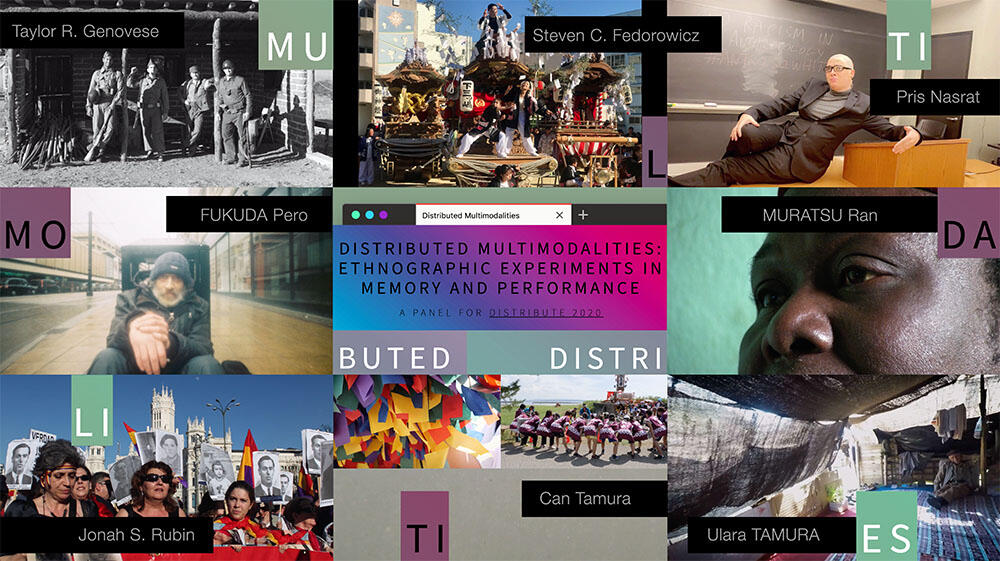Distributed Multimodalities: Ethnographic Experiments in Memory and Performance
Multimodalidades distribuidas: Experimentos etnográficos en memoria y performance
A panel for Distribute 2020
group link for conference participants
Streaming Live Friday, May 8, 2020 at 3:00am, 11:00am, and 7:00pm UTC.

Organizers
Taylor R. Genovese (Arizona State University)
Can Tamura (Filmmaker)
Panel Abstract (English)
This panel explores historical, social, and cultural memory as distributed phenomena in the context of performance. We envision performance taking several ethnographic modes (with the caveat that these modes are not an exhaustive list): the practice of ethnography as being inherently dramaturgical and performative (Denzin 2003); the ways in which our research participants may perform in the presence of a researcher; the embodied, performative use of multimodal tools, such as the taking of photos, the recording of video, and the sharing of digital media; performance as a way of disseminating ethnographic data, whether that be through photographs, films, dance, theatre, music, soundscapes, etc.; and performance as a theoretical stance—a hacking of the Aristotelian notion of “phronesis,” an applied, active wisdom that is set apart from analytical knowledge (episteme) and technical knowledge (techne) by taking seriously the social and the political (Flyvbjerg 2001).
This panel hopes to raise important questions such as: what kind of shifts in positionality may take place when one takes seriously the distribution of one’s ethnographic and personal performative practices, whatever they may be? How does performance become a means of distributing collective forms of memory? In what ways can multimodality be deployed within the discussion of performance, memory, and distribution?
Additionally, this panel is interested in how one’s ancillary performative practices (i.e. hobbies or external artistic endeavors) can generate new openings within one’s ethnographic research. We are attentive to the ways in which performance can break down contrived divisions between “serious scholarship” and creative pursuits; for example, if a phronetic approach to ethnography is deployed, how might it disrupt the established positivist, Western conception of what scholarship, learning, knowledge, dissemination, etc. can and should be (Genovese 2019)? In what ways might ethnographic phronesis (re)distribute research opportunities and their dissemination in a more egalitarian and decolonial fashion?
With this in mind, this panel hopes to produce an experimental audiovisual presentation in which each presenter’s research is not individually presented, but instead is woven among and between the other presentations—illuminating and generating previously unseen elements. This sensory approach—highlighting primarily the visual and the sonic—will evoke a contextual collaboration through juxtaposition and superimposition (for an example: see Tamura's film Je Suis Snowed In). The entire presentation will be descriptively hard captioned—as well as include audio descriptors— in order to make it as accessible as possible.
Resumen del panel (Español)
Este panel explora la memoria histórica, social y cultural como fenómenos distribuidos en el contexto del performance. Concebimos que el performance asume varios modos etnográficos (con la advertencia de que estos no son una lista exhaustiva): la práctica de la etnografía como inherentemente dramatúrgica y performativa (Denzin 2003); las formas en que los participantes en nuestra investigación actúan en presencia de un investigador; el uso corporal y performativo de herramientas multimodales como la toma de fotos, la grabación de video y el intercambio de medios digitales; el performance como una forma de diseminar datos etnográficos, ya sea a través de fotografías, películas, danza, teatro, música, paisajes sonoros, etc.; y el performance como una postura teórica: un jaqueo de la noción aristotélica de “phronesis”, un saber activo y aplicado que se diferencia del conocimiento analítico (episteme) y el conocimiento técnico (techne) al tomar en serio lo social y lo político (Flyvbjerg 2001). Este panel se presenta como un filme experimental en el que la investigación de cada presentador no se muestra individualmente, sino que se entrelaza con y entre las otras presentaciones, iluminando y generando elementos que no habían sido vistos.
References
Denzin, N.K. (2003). Performance Ethnography: Critical Pedagogy and the Politics of Culture. Thousand Oaks: Sage Publications.
Flyvbjerg, B. (2001). Making Social Science Matter: Why social inquiry fails and how it can succeed again. Cambridge: Cambridge University Press.
Genovese, T.R. (2019). ‘Going Gonzo: toward a performative practice in multimodal ethnography’, entanglements, 2(1): 97-110.
Panelists & Presentations
Neighborhood Autumn Festival in Japan: A Multimodal Visual Ethnography and Performance
Festival barrial de otoño en Japón: una etnografía visual y performance multimodal
Steven C. Fedorowicz (Kansai Gaidai University)
Sitting Gazing Gazed
Sentado Mirando Mirado
FUKUDA Pero (Ritsumeikan University)
"You're breaking my immersion!" Dispatches from a simulated war zone
“¡Estás rompiendo mi inmersión!” Noticias desde una zona de guerra simulada
Taylor R. Genovese (Arizona State University)
Multimodal Spirits
Espíritus multimodales
MURATSU Ran (Tokyo University of Foreign Studies and Kyoto University)
Dragthropology: Queer and trans theoretical transformations through enraged comedy
Dragtropología: transformaciones teóricas queer y trans a través de la comedia enfurecida
Pris Nasrat (Independent Scholar)
Beyond an Informational Approach to Memory Politics: Re-membering Personhood at Spanish Mass Grave Exhumations
Más allá de un enfoque informativo sobre la política de la memoria: re-cordando la condición de persona en las exhumaciones de fosas comunes españolas
Jonah S. Rubin (Knox College)
Kiriko Matsuri of Noto, Japan: The Outsider's Body as a Resource for Maintaining Local Rituals
Kiriko Matsuri de Noto, Japón: el cuerpo del outsider como recurso para mantener los rituales locales
Can Tamura (Filmmaker)
From Backwardness to Pride: Yörük Cultural Revitalization through Performances in the Largest Nomadic Festival in Turkey
Del atraso al orgullo: revitalización cultural yörük a través de performances en el festival nómada más grande en Turquía
Ulara TAMURA (Kanazawa University)